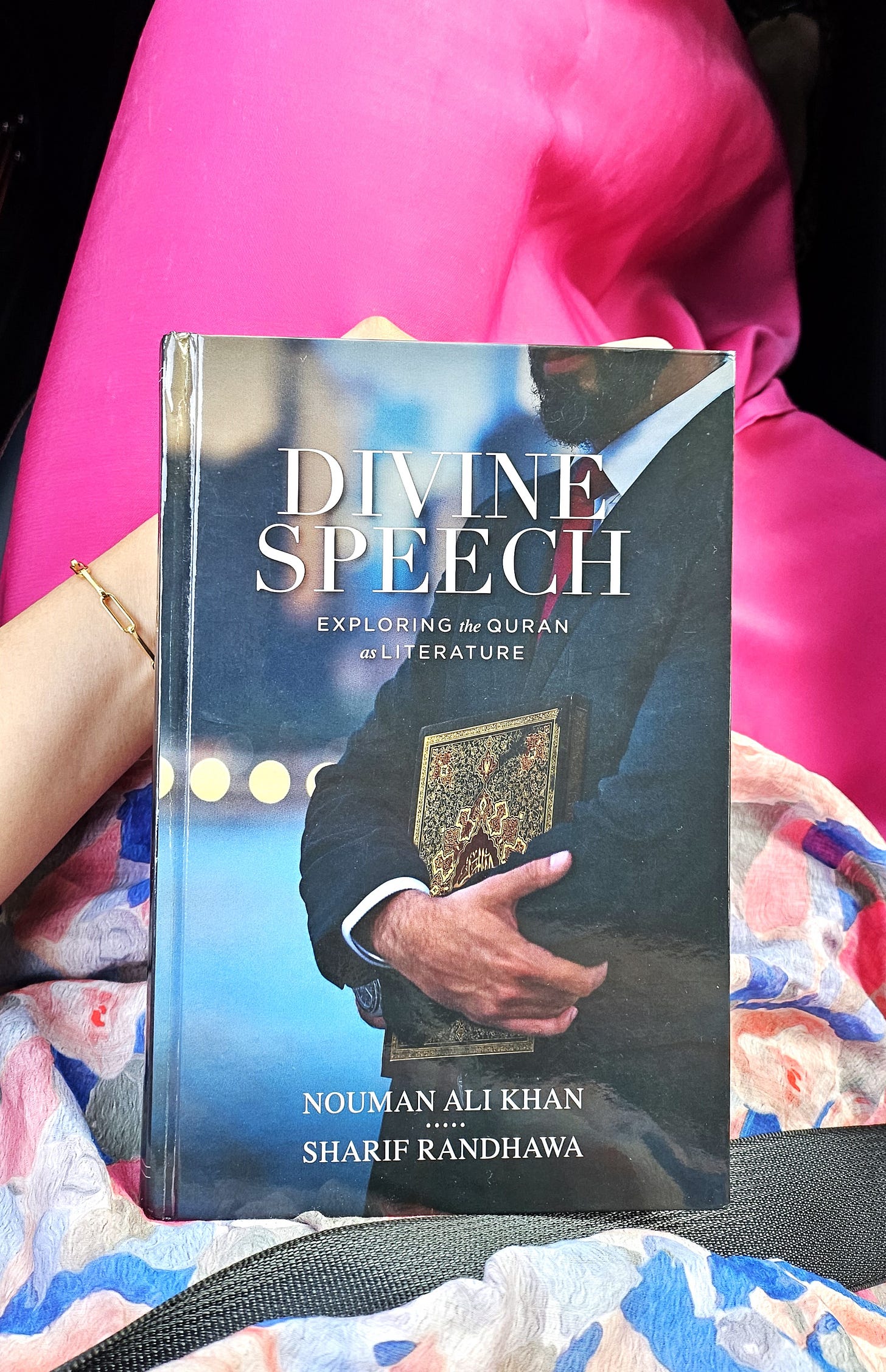As we celebrate the arrival of this year’s Ramadhan, I found myself reaching for Islamic books to read and get into the right mindset in welcoming the Holy month.
I picked up an old book from my bookshelves, Divine Speech by Nouman Ali Khan and Sharif Randhawa. Through this book, the authors explore The Quran from a literary perspective. Divine Speech studies The Quran’s structure of sentences, prose, word selection, etc.
The Quran is considered one of the miracles in Islam and it is the direct speech from God, sent to humanity through Muhammad. For me, it is interesting to learn more about The Quran through the linguistic point of view, on top of the study of Tafseer (translations).
I must tell you that if you are looking for Islamic spirituality and motivational books, then this is not the book to read. Divine Speech is wholly academic facts and research, focusing on the linguistics angle of The Quran. However, I have to say that I finished reading Divine Speech with a renewed appreciation of The Quran 🤩 as one of the miracles in the religion.
There are a lot of things to share with you from Divine Speech so I intend to split this book review into two parts! 😊
Some of my favorite findings from Divine Speech:
1. The Ring Formation of The Quran
One of the most mind-blowing analyses of The Quran is the symmetry of the surahs (loosely known as the chapters of The Quran). Before the recent discovery of the symmetrical patterning of ring formation, which is very prominent in the surahs, it is often thought that the verses in the Quran are arranged haphazardly.
Western readers are used to and often expect a book to flow in sequential order (A,B,C,D). Therefore, the seemingly jumbled themes and ideas in a single surah can look quite confusing.
For most surahs in The Quran though, the verses are formed in a ring composition. This means that it can either have a discrete center with two halves connecting (A,B,C,B’,A’), or a mirror composition (A,B,C/C’,B’,A’).
For example, in surah 101: The Crashing Blow (Al-Qari’a) below, it is easy to see the ring formation of A,B,C,C’,B’,A, which is a mirror composition.
The surah is framed by two isolated terms at the outer ring: A, “The Crashing Blow” and A’, “Blazing fire”. The Crashing Blow refers to the cosmic upheaval of Judgment Day, where blazing fire refers to Hell. The relationship between A and A’ as manifestations of divine judgment is emphasized by their placement in this surah, and also their rhyme (qari’a / hamiya).
The second ring, B and B’ consist of questions, the former about “the Crashing Blow” and the latter about “the Abyss”.
At the core of the surah are C and C’, each containing symbolic parallelism.
C consists of parallel similes that offer glimpses of “the Crashing Blow”, comparing people to scattered moths and mountains to tufts of wool. Meanwhile, C’ consists of the outcome of Judgment, containing parallel portraits of the fates of those who righteous and those who are not.
There are other passages and surahs in the Quran with this ring formation, from short passages (The Throne Verse: Ayah al-Kursi), to longer surahs such as Surah Yusuf, which are explained thoroughly in Divine Speech.
Thus, through the ring formation and parallels of the surahs, we can see that the Quran is very structured and organized 👍🏻 unlike the claims made by earlier scholars.
2. Word Order in The Quran
Most of the time, casual speakers and listeners do not attach any significant meaning to the order of items mentioned. For example, when you describe someone as kind, intelligent, and hardworking, you will not think that “kindness” is the foremost quality of this person, or “hardworking” is the least quality of the three.
In this regard, The Quran is a unique case. The precision of The Quran’s choice of words are really interesting as it adjusts its word order to emphasize the context.
Divine Speech has a few interesting examples of The Quran’s word order, and I will share one of my favorites here:
Child murder was common in the Arabian Desert then, as an extreme measure to the threats of poverty and hunger 😔 The Quran mentions about the abolishment of this practice twice:
Surah 6: The Cattle (Al An’am)
…. and do not kill your children out of poverty. We will provide for you and for them.
Surah 17: The Night of Journey (Al Israa).
Do not kill your children out of fear of poverty. We will provide for them and for you. Truly, killing them is an enormous wrong.
At a glance, these verses appear to be rather similar. However, upon closer inspection, you will see that these 2 verses address two categories of parents.
The parents in the first scenario are told not to kill their children out of poverty, meaning these parents are already suffering from hunger and poverty, thus wanting to kill their children because they feel they can’t feed themselves. Thus, the promise of provision is directed to these parents first, because the immediate concern is their suffering.
Meanwhile, the parents in the second scenario are told not to kill their children out of fear of poverty, meaning these parents have yet to experience poverty, but anticipate that by having a child, they might become poorer. Therefore, the promise of provision is directed to the child first, assuring the parents that the child will be God’s responsibility.
It is mind-blowing that The Quran takes such great care regarding the word order in its surahs 🤯 Truly, I would have never noticed these details by reading the translations only because as casual readers we usually don’t give serious consideration to the word order.
There are a lot more examples of interesting word orders in Divine Speech so please pick up this book as your next read if you enjoy this kind of stuff like I do 😉
3. Storytelling In The Quran
One of the best things in The Quran that normal people like us can easily appreciate is the prophetic stories.
I have always loved the story of Prophet Yusuf and I won several storytelling competitions in primary school by retelling the story 🫣 I have memorized the story by heart but when I reread the explanation of Surah Yusuf in Divine Speech, I was blown away once again… all the nuances and details!
The role of irony in Surah Yusuf is one of the best things I learned from this book… the reversal of roles and expectations, either in characters, story, or the audience.
I hope you are familiar with the story for easier understanding, but here are some of the layers of irony employed in the story:
When the brothers get jealous of their father, Yaaqub’s, attention to Yusuf, they plan to get rid of their younger brother, hoping to get Yaaqub’s attention to them again. But, ironically, the scheme accomplishes the very opposite of that. Yaaqub becomes emotionally distanced from the brothers and more preoccupied with the thoughts of his missing son, Yusuf.
After the brothers cast Yusuf into a well, they return home with the story for Yaaqub: “….and a wolf ate him. But you would not believe us, even if we were telling the truth!…” (12:17). We know they are lying, and ironically, the brothers will come to Yaaqub with a true confession in the latter part of the story but he will not believe them.
Caravan traders pick up Yusuf from the well and sell him off as a slave, feeling indifferent towards the poor boy. Ironically, later in the story, the minister’s wife becomes utterly obsessed with him.
The wife attempts to seduce Yusuf but when he refuses her, Yusuf is imprisoned. Although the wife is the guilty one and her guilt is even exposed, ironically, the innocent Yusuf is the one thrown into prison.
Yusuf’s interpretation of the King’s dream saves the administration from the devastating consequences of a long famine. The grateful King orders Yusuf’s release from prison and appoints him to a high office with control over the storehouses in Egypt. Thus ironically, Yusuf entered the prison as a lowly slave and exits as one of the highest-ranking officials in the government.
When the brothers come to see Yusuf for food (not knowing they are facing their brother), Yusuf asks the brothers to bring Benjamin with them the following year when they come again for food. Benjamin is then detained for “stealing the King’s utensils” but the brothers swear that “they have not been thieves” (12: 73). Ironically, they are unaware that the “theft” they are truly responsible for is the separation of Yusuf and his father.
And many more examples of irony!
Until the end of the story, the plot is filled with irony. The chain of events that appears to spell misfortune - the brothers’ scheme, Yusuf being sold as a slave in a foreign land, Yusuf’s imprisonment, etc, - leads to Yusuf’s appointment as a high-ranking official, being able to provide for his family during famine, and the fulfillment of prophetic dream he had as a boy.
The story of Yusuf employs an amazing use of irony and makes the story even more nuanced and interesting.
Final Thoughts
Truly, the linguistics of The Quran is a challenging topic to explain in English. Explaining the nuances of Arabic grammar and selecting suitable words in English is a challenge, and Divine Speech does a great job, in my humble opinion! The book kept me hooked from start to finish 😍
Before reading Divine Speech, I was aware of the beautiful poetry style of The Quran verses in terms of the rhyming sound. The verses often have matching endings that are so nice to hear especially when recited with different styles 🤍 Now I am even more impressed with the Quran after learning it through the linguistic lense.
Highly recommend this book if you are looking for something to read this Ramadhan.
Thank you for reading as always and do share this post with friends and family if you benefit from it.
Salam Ramadhan :)
Ristina xx
Hey friends!
I intend to write short reviews of books I read and share them with you. I love reading but often struggle to find good book recommendations, so I thought, hey why not share my thoughts with other like-minded readers?
Shelves Upon Shelves is a simple book review for those who are always looking for good book recommendations but don’t want to flip through thousands of reviews and comments on Goodreads/forums/blogs.
This newsletter will arrive in your inbox every Friday so subscribe if you’d like to receive small book recommendations to read on the weekends!





